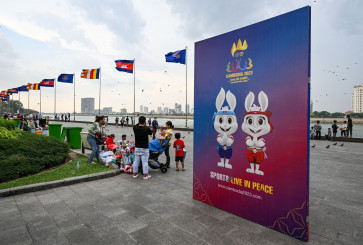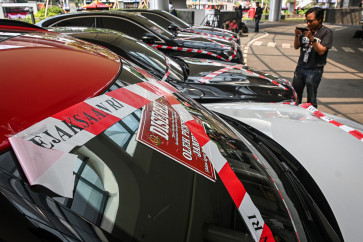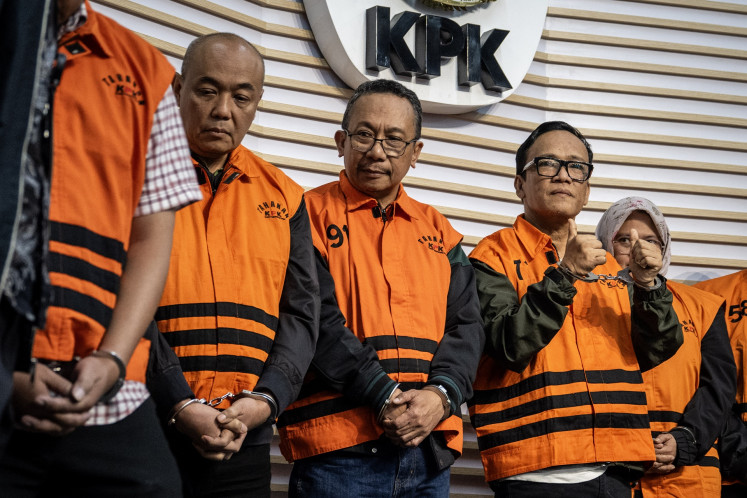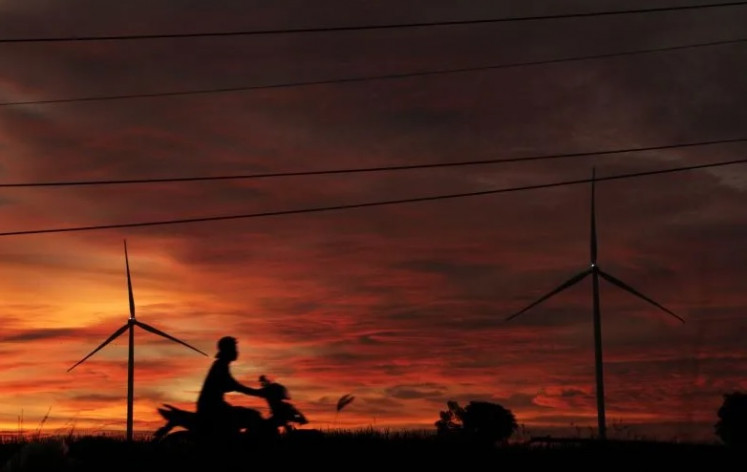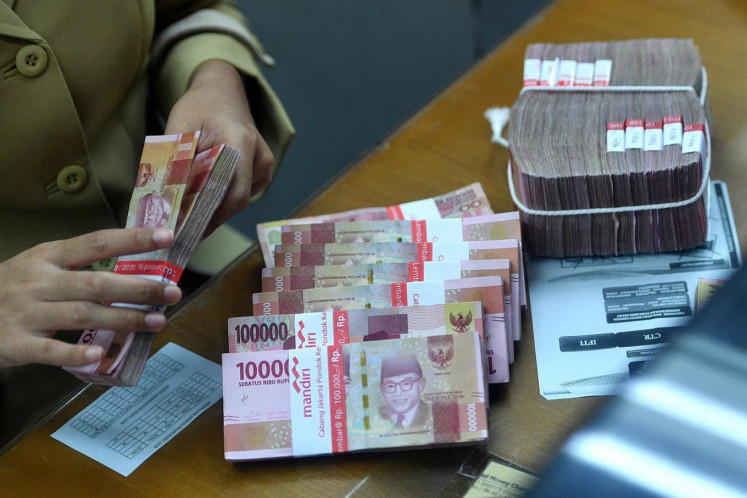Popular Reads
Top Results
Can't find what you're looking for?
View all search resultsPopular Reads
Top Results
Can't find what you're looking for?
View all search resultsShould we welcome the Anak Dalam people to the new world?
âIs it a fake?â The question just keeps coming
Change text size
Gift Premium Articles
to Anyone
'Is it a fake?' The question just keeps coming. Many people found it hard to believe that President Joko 'Jokowi' Widodo really met and talked with the indigenous people of the Anak Dalam tribe in Jambi, despite their pictures appearing in the media.
For a while, 'Suku Anak Dalam' became a top search in Google. People, perhaps, tried to find answers to their suspicions. Whatever the case, their doubt is understandable. Equally understandable, in fact, as questioning why Jokowi ' or, more precisely, his PR team ' despite his tight schedule, spared time to visit the nomadic tribe.
Indigenous people living either deep in the jungle or on remote highland are perceived as profoundly different from us.
Aside from their pre-modern ways, they are also considered to be noble savages ' isolated and lacking worldly knowledge, yet overwhelmingly innocent, sincere and communal. They are everything other than us, who are rational, yet self-interested.
Such imagery, usually, leads us to a belief that they are a relic from the past and need to be either protected or modernized. This is true in the case of our recent imagery of the Anak Dalam people.
In response to Jokowi's intention to resettle them, many thought the President lacked commitment to the preservation of their culture. They seem to believe that we had to either preserve their cultural authenticity or to help them cope with the present reality.
In fact, the radical alterity of the indigenous tribe is our invention. There is a famous case of the Tasaday people in the Philippines. In 1971, Manuel Elizalde, head of a government agency dedicated to protecting Philippine cultural minorities, brought to the attention of the world the Tasaday people of Mindanao Island. They were said to be a Stone Age tribe ' living in caves, using stone tools and even lacking a word for war.
The tribe made headlines. In 1972, National Geographic even published an exclusive documentary titled 'The Last Tribes of Mindanao.' The late Philippine President Ferdinand Marcos then declared 182 square kilometers of forest surrounding the Tasaday's caves as Tasaday preservation area.
Later, after Marcos' presidency had ended, international anthropologists and journalists studied the Tasaday people. It was found that, though the Tasaday people were real, they were forced to put on a Stone Age living style by Elizalde. It was, simply put, a worldwide hoax, a beneficial hoax for Elizalde, indeed, as it portrayed him as the protector of this fragile culture from the distant past.
I do not intend to insinuate that Jokowi's engagement with the Anak Dalam people is another attempt to sham the public. However, anthropologists' writings on the Anak Dalam people show that the tribe is anything but a group of isolated people.
If we think that the tribe is ignorant to the outside world and unchanged, we share one serious misunderstanding that enabled the arranged spectacle of the Tasadaya global hoax.
The Anak Dalam people maintain a seemingly authentic nomadic culture, first of all, due to their active adjustment to fluctuations of global commodity prices and social dynamics from time to time. In the 17th century, as Barbara Andaya Watson wrote in her book, they cultivated pepper and traded with merchants from Jambi and Palembang.
And, like most contemporary trade, conflicts occurred as the trading involved debts and different currencies or modes of payment.
In the 19th century, a Dutch ethnographer noted that people were trading linen and tobacco with the Anak Dalam in exchange for honey and resin. In the 1980s, research conducted by Gerard Peerson showed that the expansion of farming settlements into the forests compelled them to change some features of their lifestyle. They began to manufacture utensils and hunt animals for exchange, or be employed by the villagers.
Furthermore, their life in the forest itself was not something they naturally accepted. One of the Anak Dalam's myths, collected in the 19th century, says that their ancestors were sword bearers for Alexander the Great.
However, due to violations of the incest taboo, their forebears fled to the jungle in shame and lived there. This myth shows that even among the Anak Dalam people themselves, there is a perpetual question of
why they have to live deep in the forest.
Given that cultural authenticity is more likely to be a thing of invention, the central concern faced by so-called indigenous tribes like Anak Dalam is not the preservation of the culture itself.
However, if they are to be forced to live in fixed settlements, either by the harsh expansion of oil palm plantations or by the government policy (or both), they will undergo a process of proletarization, which is very likely to happen to displaced people anywhere.
They will be dissociated from their means of subsistence ' the forest in which they hunt and cultivate their food ' which they feel is already happening.
And, in contrast to highly mobile groups, such as the Chinese, Butonese or Padang, we can expect they have no social network and only minimal resources to hone the skill needed to thrive in the new environment.
The young people, predictably, will be forced into cheap labor and the old ones will be even less fortunate. The new setting will also reduce the kinship relations beneficial for providing a kind of social security among them.
Hence, we couldn't admit them to the brave new world solely based on our pity for them for not having a permanent settlement or not being educated.
Culture is remarkably adaptive, but careful social planning is needed to ensure that, if they have no choice but to move to a new environment, they won't be deprived of the resources and access they need to make for a proper livelihood.
Although that task requires considerable effort, a successful push in encouraging local governments and ministries to pay attention to the deprived indigenous population would mean a lot for the President himself. It will show indigenous people everywhere that the President and his government sincerely care for them.
_________________________________
The writer is a researcher at LabSosio, Center of Sociological Studies, University of Indonesia. He is also a member of Purusha Research Cooperative


